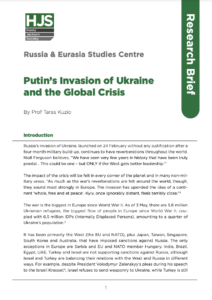 Russia’s invasion is a global event of rare magnitude that will send shockwaves to “every corner of the planet”. It will have ramifications every bit as significant as the fall of the Berlin Wall or the Cuban Missile Crisis.
Russia’s invasion is a global event of rare magnitude that will send shockwaves to “every corner of the planet”. It will have ramifications every bit as significant as the fall of the Berlin Wall or the Cuban Missile Crisis.
In a new paper for the Henry Jackson Society, Dr Taras Kuzio, the first UK academic to have been sanctioned by the Kremlin, sets out seven areas that will see totemic change as a consequence of Putin’s invasion.
Ukraine is both the centre of the conflict and the nation that will face the biggest changes as a result of the conflict. Dr Kuzio argues that Ukraine’s bipolar state is over and “Ukraine’s future will be irrevocably within Europe”.
Russia meanwhile faces a likely further descent into repressive totalitarianism, increasingly isolated from the outside world. Sanctions, Dr Kuzio predicts, will hit the Russian economy hard and could be “catastrophic” for Russia’s economic wellbeing.
China, which longs to usurp the US-led unipolar world it so dislikes, is watching the conflict closely. Having seen the impact of sanctions, it is likely to pursue a form of decoupling to reduce its dependence on Western sanctions should it invade Taiwan.
Trans-Atlantic and European security should in the long term be bolstered by the shock of Putin’s actions, according to Dr Kuizo. He argues that in a raft of spheres from German defence spending to Russian money laundering in the UK, political pressure will see Western states take steps that they should have long ago adopted.
The conflict provides an opportunity for the institutions of international justice to prove their capacity to tackle war crimes. With investigations already opened into Russian war crimes, the International Criminal Court should have ample opportunity to fulfil its mandate.
The economic and financial impacts of the war are already being felt by most if not all people, yet Dr Kuzio predicts a prolonged period of sluggish global growth will follow the war. Yet, the impact on the West is likely to be a fraction of that faced by Russia where runaway inflation will be followed by the slow ruin of economic isolation.
Finally, the shock already faced in global energy markets is unlikely to fully dissipate. Many spare parts are no longer available to Russian producers and the China-Russia pipeline unable to replace Europe as an export destination, Russian energy exports are likely to continue to decline.
In response to these events, Dr Kuzio makes ten policy recommendations:
- Putin is a threat to not only European security but to world peace and stability. His invasion of Ukraine has caused a world crisis with unforeseen consequences. Putin’s obsession with Ukraine is a product of his bizarre attempt to enter Russian history as the “Gatherer of Russian Lands”. Putin needs to be replaced. Western governments should support regime change in Russia. Putin remaining in power after the conclusion of a peace agreement should not be an option.
- The EU should expand its sanctions by cutting all trade with Russia and sanctioning Russian oil and gas. The West should not finance Russia’s war machine. Sanctioning Russian energy will enable the removal of Russian banks Gazprombank and Sberbank from SWIFT.
- Western pressure should be brought upon China to not support Russia militarily or to assist the Kremlin to evade sanctions.
- The EU should put extraordinary pressure on Hungary and Serbia to fall into line on Western sanctions and policies towards Russia. EU financial assistance to Hungary should be reduced in the event that Orban continues to resist the common line on the invasion of Ukraine.
- Western governments should support the creation of a fund made up of the proceeds from the sale of sanctioned oligarch assets and a percentage of the income earned by Russia from oil and gas exports (while these continue). The funds would be in the form of reparations to be used for the rebuilding of Ukrainian towns, cities, infrastructure, hospitals and schools deliberately targeted, damaged and destroyed by Russian military attacks.
- The West should back war crimes trials of Putin and other Kremlin and military leaders behind the criminal invasion and war.
- All Russian State Duma deputies, government ministers and members of the Russian Security Council should be individually sanctioned.
- Western sanctions should remain in place until Russian forces are withdrawn from Ukrainian territories occupied since 2014 in the Donbas and in 2022 since the war commenced.
- The West should support the holding of a referendum on Crimea’s future within Russia or Ukraine that would be supervised by the OSCE (Organization for Security and Cooperation in Europe).
- Russia’s weakness in Eurasia is the EU’s opportunity to fashion a security dimension to the Eastern Partnership. Particular focus should be placed on the strategically important Southern Caucasus and Azerbaijan’s importance as an alternative energy supplier to Europe.


